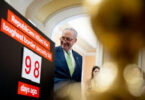WASHINGTON (AFP): US Defense Secretary Lloyd Austin on Saturday blasted China’s “provocative, destabilising” military activity near Taiwan, as well as Beijing’s growing aggression across the wider Asia-Pacific region.
Tensions between Washington and Beijing are soaring over democratic, self-ruled Taiwan, which China views as its territory and has vowed to seize one day, by force if necessary.
Beijing has conducted dozens of incursions into Taiwan’s air defence zone this year, and on Friday, Defence Minister Wei Fenghe warned Austin that China was prepared to go to war if the island declares independence.
In an address to the Shangri-La Dialogue security summit in Singapore, Austin took aim at Beijing’s “growing coercion” towards Taiwan, a day after holding his first face-to-face talks with Wei.
“We’ve witnessed a steady increase in provocative and destabilising military activity near Taiwan,” he told the forum, which is attended by defence ministers from Asia and around the world.
“That includes (Chinese military) aircraft flying near Taiwan in record numbers in recent months, and nearly on a daily basis,” he said.
“We categorically oppose any unilateral changes to the status quo from either side,” he added.
But he also stressed the importance of “fully open lines of communication with China’s defence leaders” in avoiding miscalculations.
“These are deeply, deeply important conversations.”
On Friday, Wei had warned Austin that “if anyone dares to split Taiwan from China, the Chinese army will definitely not hesitate to start a war no matter the cost”, according to Chinese officials.
He also vowed that Beijing would “smash to smithereens any ‘Taiwan independence’ plot and resolutely uphold the unification of the motherland”, according to the Chinese defence ministry.
Taiwan’s foreign ministry said it rejects Beijing’s “absurd claims”.
“The Taiwanese people will not bow to the threat of force by the Chinese government,” it said in a statement.
The war of words was just the latest between Washington and Beijing.
They have clashed over everything from China’s claims in the disputed South China Sea to trade and human rights in Hong Kong and Xinjiang.
AIRCRAFT INCURSIONS
Tensions over Taiwan have escalated in particular due to increasing Chinese military aircraft incursions into the island’s air defence identification zone (ADIZ).
President Joe Biden, during a visit to Japan last month, appeared to break decades of US policy when, in response to a question, he said Washington would defend Taiwan militarily if it is attacked by China.
The White House has since insisted its policy of “strategic ambiguity” over whether or not it would intervene has not changed.
In Saturday’s address, the Pentagon chief reiterated US criticism of China’s increasingly “coercive and aggressive approach to its territorial claims”.
China claims almost all of the resource-rich South China Sea, through which trillions of dollars in shipping trade passes annually, with competing claims from Brunei, Malaysia, the Philippines, Taiwan and Vietnam.
Beijing has been accused of deploying a range of military hardware including anti-ship missiles and surface-to-air missiles there, and has ignored a 2016 international tribunal decision that declared its historical claim over most of the waters to be without basis.
“Indo-Pacific countries shouldn’t face political intimidation, economic coercion,” said Austin, using an alternative name for the Asia-Pacific.
He also criticised Russia’s invasion of Ukraine, at the same time taking a veiled swipe at China’s growing aggression.
“Russia’s invasion of Ukraine is what happens when oppressors trample the rules that protect us all,” he said.
The United States and China have been at loggerheads over the invasion, with Washington accusing Beijing of providing tacit support for Moscow.
China has called for talks to end the war, but has stopped short of condemning Russia’s actions and has repeatedly criticised American arms donations to Ukraine.
China’s defence minister will address the summit on Sunday, its final day.






